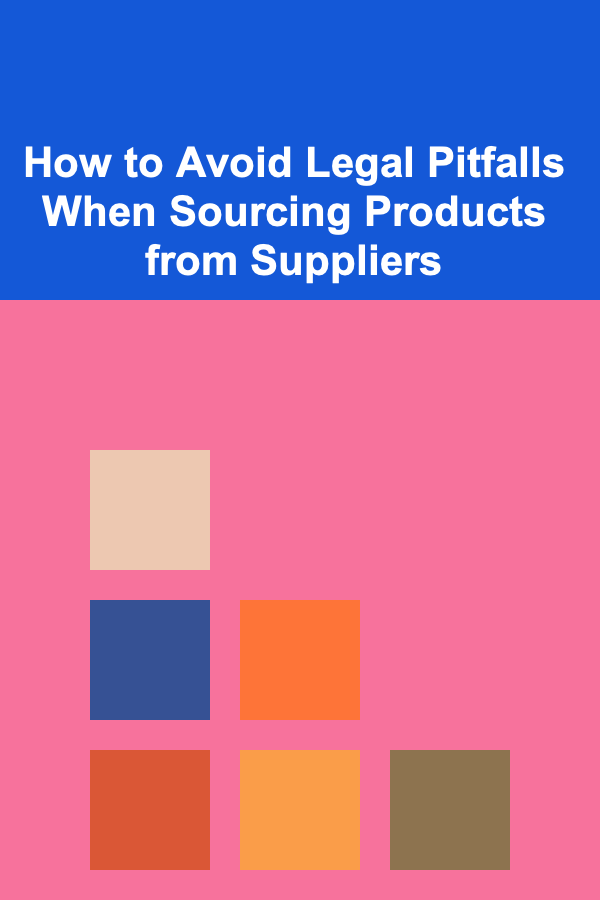
How to Avoid Legal Pitfalls When Sourcing Products from Suppliers
ebook include PDF & Audio bundle (Micro Guide)
$12.99$5.99
Limited Time Offer! Order within the next:

Sourcing products from suppliers is a crucial aspect of running a successful business, whether you're an e-commerce entrepreneur, a small business owner, or part of a larger corporation. However, this process is fraught with potential legal pitfalls that can lead to costly mistakes, reputation damage, and even legal action. Navigating these pitfalls requires vigilance, a solid understanding of legal principles, and effective strategies to ensure your business stays compliant with laws and regulations.
This actionable guide will walk you through the essential steps to help you avoid legal risks when sourcing products from suppliers.
Conduct Thorough Supplier Vetting
Background Checks and Due Diligence
Before entering into any agreement with a supplier, it's essential to carry out thorough due diligence to ensure they are reliable and legally compliant. This includes researching their history, reputation, and legal standing.
- Company Research: Investigate whether the supplier is a legitimate business entity. Verify their registration details, business licenses, and tax compliance. This can be done through public business databases or third-party verification services.
- Reviews and References: Look for online reviews, testimonials, and seek out references from other businesses that have worked with the supplier. Check platforms such as Trustpilot, Google Reviews, or industry-specific forums.
- Compliance Records: Check whether the supplier has faced legal actions, penalties, or controversies in the past. A supplier with a history of lawsuits, especially concerning product quality or intellectual property violations, may pose a significant risk.
Supplier Certifications and Audits
For suppliers involved in manufacturing, ensure that they hold the necessary certifications. These might include:
- ISO certifications for quality control and operational standards.
- Ethical sourcing certifications like Fair Trade or B Corp, which may be crucial for companies concerned with environmental impact or worker rights.
- Compliance with safety standards, particularly for industries like food, pharmaceuticals, or electronics, where specific regulatory bodies enforce strict rules (e.g., FDA, CE markings, RoHS compliance).
If possible, conduct regular audits of your suppliers to ensure ongoing compliance with both legal and contractual obligations.
Understand and Negotiate Contracts Thoroughly
Contract Clarity and Legal Protection
One of the most crucial steps in protecting yourself legally when sourcing products is ensuring your contract with the supplier is comprehensive, clear, and legally binding. A well-drafted contract can prevent misunderstandings and provide legal remedies in case of disputes.
- Define Product Specifications: Ensure the contract clearly defines the products being sourced, including their specifications, quality standards, and any certifications required. This reduces the risk of receiving substandard products that could result in liability issues.
- Payment Terms: Outline payment schedules, methods, and any penalties for late payments. Specify if payments will be made upfront or upon delivery. Ensure there's clarity about any deposits or guarantees required.
- Intellectual Property (IP) Protection: Make sure that the contract addresses the ownership of intellectual property rights. If you're sourcing custom-made products, protect your designs, patents, or trademarks through clauses that limit the supplier from using or replicating your product without consent.
- Shipping and Delivery: Clearly define shipping terms, including shipping costs, delivery schedules, and responsibilities. Be specific about incoterms (e.g., FOB, CIF) to outline the supplier's and your own liability in case of shipping delays or damaged goods.
- Dispute Resolution: Incorporate a clause on dispute resolution, specifying whether arbitration, mediation, or litigation will be used in case of a conflict. Specify the jurisdiction or venue for resolving disputes.
Legal Review
Before signing any supplier contract, it's advisable to have a legal expert, particularly one with experience in international trade law, review the agreement. A lawyer will help you identify potential red flags, ambiguous terms, or clauses that may expose you to unnecessary legal risks.
Ensure Product Compliance with Regulations
Understand Regulatory Requirements
Different products have different legal requirements depending on the country or region where you sell them. Failure to comply with these laws can result in fines, product recalls, and even lawsuits.
- Product Safety and Standards : Products like electronics, toys, and cosmetics must comply with strict safety standards. For example, electronics may need to meet the CE marking in Europe or UL certification in the United States.
- Import and Export Regulations: If you're sourcing from international suppliers, you need to be familiar with the relevant import/export regulations, including customs duties, tariffs, and trade restrictions. Failing to comply with these can result in delays and penalties.
- Labeling Requirements: Ensure your products meet local labeling laws. For instance, certain countries require specific language on labels, such as nutritional information for food or warning labels for hazardous substances.
- Intellectual Property Rights: Check if the products you are sourcing are infringing on any patents, trademarks, or copyrights. Sourcing counterfeit products, even unknowingly, can result in legal actions and financial liabilities. Use reputable suppliers who can provide evidence of legitimate sourcing and product authenticity.
Documentation and Certifications
For compliance, always request and keep documentation from your suppliers proving that the products meet relevant standards. This can include:
- Certificates of Conformity.
- Testing and inspection reports (e.g., from certified labs).
- Import licenses.
- Customs clearance documents.
If the supplier cannot provide these documents or is unwilling to cooperate, it should raise a red flag.
Protect Your Intellectual Property
Trademark and Patent Protection
When sourcing products, particularly custom-designed items, it's critical to protect your intellectual property (IP) to avoid theft, counterfeiting, or unauthorized manufacturing by the supplier.
- Trademark Your Brand: If you are sourcing products that will carry your branding (logos, packaging, or designs), ensure your brand is trademarked. This prevents suppliers from using your brand for other purposes.
- Non-Disclosure Agreements (NDAs): Have suppliers sign non-disclosure agreements (NDAs) if you're sharing sensitive information, like product designs, marketing strategies, or other proprietary data.
- Patents: If you're developing new products or designs, consider applying for a patent. Make sure the supplier does not produce, replicate, or sell your product designs without your consent.
In case of international sourcing, you'll need to protect your IP across different jurisdictions, especially in countries with lax IP laws or where counterfeiting is prevalent. International patent offices like the World Intellectual Property Organization (WIPO) offer a unified system for patent protection across multiple countries.
Be Aware of Labor Laws and Ethical Sourcing
Fair Labor Practices
One of the most overlooked legal risks when sourcing from suppliers is the potential for violations of labor laws. Suppliers operating in countries with weak labor regulations may be exploiting workers or engaging in unethical practices, which could damage your reputation and expose you to legal consequences.
- Child Labor and Forced Labor: Ensure that your suppliers comply with international labor standards by prohibiting child labor and forced labor.
- Fair Wages and Working Conditions : Check if the supplier provides fair wages, safe working conditions, and reasonable hours. Some certifications, like Fair Trade, may give you peace of mind.
- Supply Chain Transparency: Consider conducting audits or asking for transparency reports that demonstrate your supplier's commitment to ethical sourcing.
If you are dealing with suppliers in developing countries, consider partnering with those who adhere to responsible labor practices and human rights principles. Your company's reputation depends on it.
Implement Quality Control Measures
Inspection and Testing
Even with a reputable supplier, there is always a risk that the products you receive may not meet the expected quality standards. Inconsistent or substandard products can lead to customer complaints, product recalls, and even lawsuits.
- Pre-Shipment Inspections: Hire third-party inspection services to check the quality of the products before they leave the supplier's warehouse. This includes verifying that the products meet all agreed-upon specifications and compliance standards.
- Regular Product Testing: Establish a process for testing products regularly once they arrive at your location. For products that require specific certifications (such as safety certifications), ensure that these tests are conducted before distribution.
- Quality Control Clauses in Contract: Add clauses to your contract specifying that the supplier must meet your quality standards, with penalties for non-compliance, including product returns, refunds, or legal action.
Conclusion
Sourcing products from suppliers is a significant part of growing and sustaining your business, but it's fraught with legal challenges. By taking proactive steps, such as vetting suppliers, negotiating clear contracts, ensuring compliance with regulations, protecting intellectual property, and monitoring ethical practices, you can avoid costly legal pitfalls.
Remember that maintaining a relationship with reputable suppliers, adhering to relevant laws, and ensuring transparency at every stage of the sourcing process will help protect your business from unnecessary legal and financial risks. Whether you are a small entrepreneur or a large corporation, taking the time to navigate these challenges properly will safeguard your operations, protect your brand, and allow you to scale your business effectively.

Affordable Options for Home Security Systems: Keeping Your Home Safe on a Budget
Read More
How to Keep Your Entryway Clutter-Free and Functional
Read More
How to Start a Successful YouTube Channel for Revenue
Read More
Operations Research Analyst: Strategies for Optimal Decision Making
Read More
Time Management for Job Seekers: Finding Balance While Applying
Read More
How to Track Credit Card Interest Expenses and Negotiate Lower Rates
Read MoreOther Products

Affordable Options for Home Security Systems: Keeping Your Home Safe on a Budget
Read More
How to Keep Your Entryway Clutter-Free and Functional
Read More
How to Start a Successful YouTube Channel for Revenue
Read More
Operations Research Analyst: Strategies for Optimal Decision Making
Read More
Time Management for Job Seekers: Finding Balance While Applying
Read More